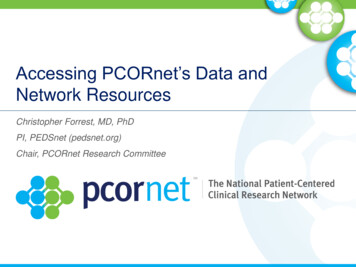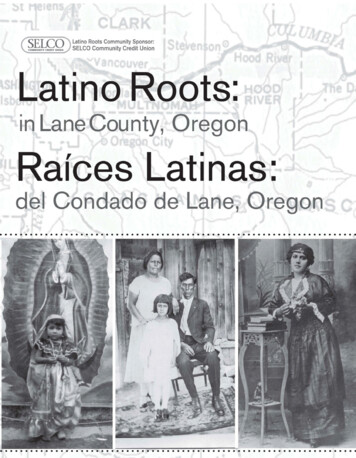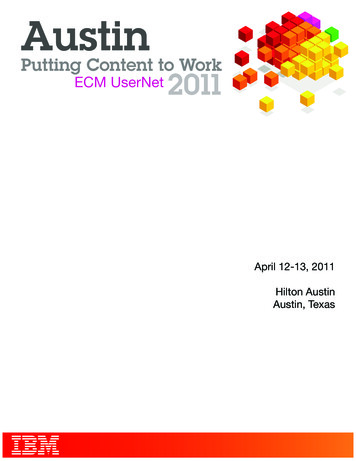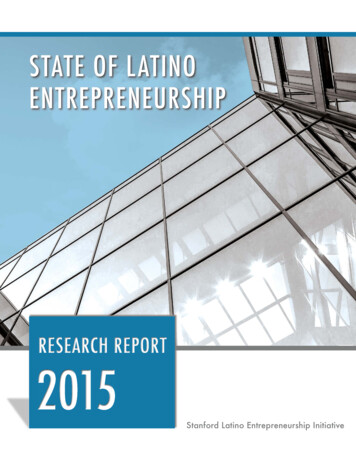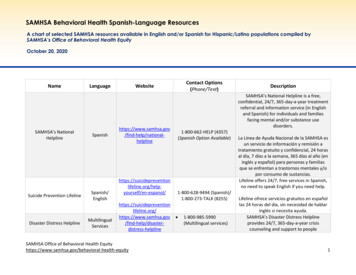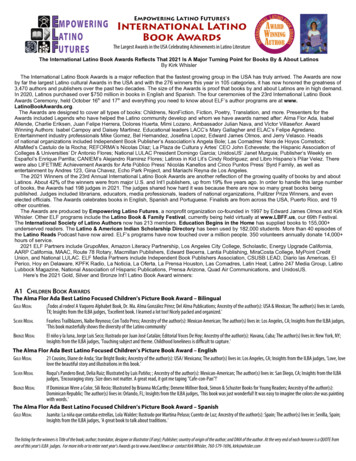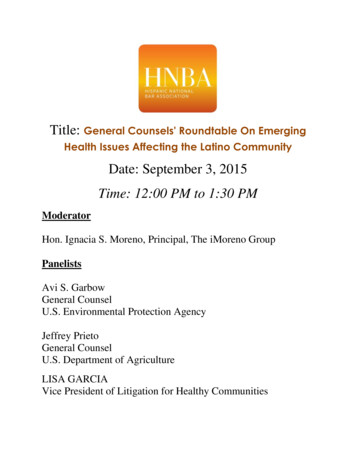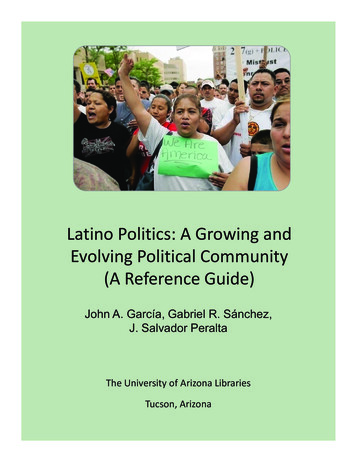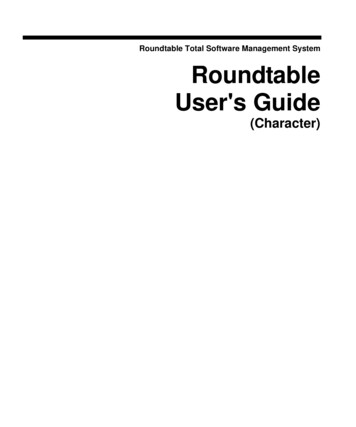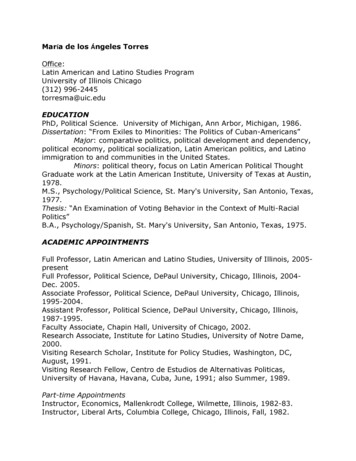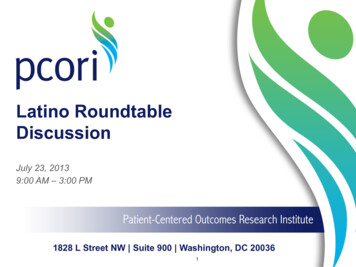
Transcription
Latino RoundtableDiscussionJuly 23, 20139:00 AM – 3:00 PM1828 L Street NW Suite 900 Washington, DC 200361
Housekeeping! Webinar participants can provide input via the webinar“chat” feature or via e-mail(latinoroundtable@pcori.org).! Submitted questions will be discussed during the publiccomment periods at 11:45 AM (ET) and 2:15 PM (ET).! Additional input and comments are welcome throughFriday, July 26, at 5 PM (ET) via e-mail atlatinoroundtable@pcori.org.2
Welcome and Overview ofPCORIAnne C. Beal, MD, MPHDeputy Executive Director and Chief Officer for EngagementLatino RoundtableJuly 23, 20133
About Us! An independent non-profit research organizationauthorized by Congress as part of the 2010 PatientProtection and Affordable Care Act (PPACA).! Committed to continuously seeking input frompatients and a broad range of stakeholders toguide its work.4
Our Mission and VisionMissionThe Patient-Centered Outcomes Research Institute (PCORI)helps people make informed healthcare decisions andimproves healthcare delivery and outcomes, by producing andpromoting high-integrity, evidence-based information thatcomes from research guided by patients, caregivers, and thebroader healthcare community.VisionPatients and the public have the information they need tomake decisions that reflect their desired health outcomes.5
PCORI’s Board of Governors Representsthe Entire Healthcare CommunityPCORI Board of Governors, March 2012, in Baltimore, MD6
Our Purpose, from the PPACA“The purpose of the Institute is to assistpatients, clinicians, purchasers, and policymakers in making informed healthdecisions by advancing the quality andrelevance of evidence concerning the mannerin which diseases, disorders, and otherPurpose health conditions can effectively andappropriately be prevented, diagnosed,oftreated, monitored, and managed throughPCORI research and evidence synthesis thatconsiders variations in patient subpopulationsand the dissemination of research findingswith respect to the relative health outcomes,clinical effectiveness, and appropriateness ofmedical treatments, services.Source: Affordable Care Act. Subtitle D, PUBLIC LAW 111–148—MAR. 23, 2010.7
Our Core Duties!!!!Establish national research prioritiesEstablish and carry out a research agendaDevelop and update methodological standardsDisseminate research findings8
National Priorities for Research andResearch AgendaAssessment of Prevention, Diagnosis, and Treatment Options Comparisons of alternative clinical options to support personalized decision making and self-care Identifying patient differences in response to therapy Studies of patient preferences for various outcomesImproving Healthcare Systems Improving support of patient self-management Focusing on coordination of care for complex conditions and improving access to care Comparing alternative strategies for workforce deploymentCommunication and Dissemination Research Understanding and enhancing shared decision making Alternative strategies for dissemination of evidence Exploring opportunities to improve patient health literacyAddressing Disparities Understanding differences in effectiveness across groups Understanding differences in preferences across groups Reducing disparities through use of findings from patient-centered outcomes research (PCOR)Accelerating PCOR and Methodological Research Improving study designs and analytic methods of PCOR Building and improving clinical data networks Methods for training researchers and patients to participate in PCOR Establishing methodology for the study of rare diseases9
Criteria for Research, from the PPACAImpact on Healthof Individuals andPopulationsAddressesCurrent Gaps inKnowledge/Variation in CarePatientCenterednessImprovabilitythrough ResearchImpact dsInclusiveness ofDifferentPopulationsPotential toInfluenceDecision MakingEfficient Use ofResearchResources10
What Makes PCORI Funding Different?! User-friendly announcements to encouragebroader range of applicants! Patient and stakeholder engagement plan! Dissemination and implementation assessment! Reproducible and transparent research plan! PCORI criteria outlined by statute! Rigorous methodology standards11
PCORI Does Not Fund Research That .! Studies cost-effectiveness! Studies causes of disease! Does not measure patient-centered outcomes! Does not compare approaches to improvingpatient-centered outcomes! Studies questions that have already beenanswered or are in the process of being answered12
PCORI’s Two Paths to Funding Research13
PFA Cycle I and II AwardsCycle I Awards25 projects in 17 states 40.7 million (over 3 years)Cycle II Awards51 projects in 20 states 88.6 million (over 3 years)14
Funded ProjectsPilot ProjectsAddressing Mental Health Needs of Rural African AmericansAssessment of Prevention, Diagnosis, and Treatment OptionsCycle II: Generating Critical Patient-Centered Information for Decision Making in Localized Prostate CancerCycle II: Treatment Preference and Patient-Centered Prostate CancerImproving Healthcare SystemsCycle II: Improving Healthcare Systems for Access to Care and Efficiency by Underserved PatientsCommunication and Dissemination ResearchCycle I: Extension Connection: Advancing Dementia Care for Rural and Hispanic PopulationsAddressing DisparitiesCycle I: Long-Term Outcomes of Community Engagement to Address Depression Outcomes DisparitiesCycle II: Padres Efectivos (Parent Activation): Skills Latina Mothers Use to Get Healthcare for Their Children15
PCORI’s First Targeted Research Topics!!!!Identified several high-priority,stakeholder-vetted topics for targetedPFAsJumpstart PCORI’s long-term topicgeneration and research prioritizationeffortLeverage stakeholder input frombefore PCORI’s existenceAllow us to build on our engagementworkResearch Topic:Treatment of severe asthma in AfricanAmericans and Hispanics/LatinosLetter of Intent Due: 8/1/13Maximum Budget: Year 1, up to 500,000total cost; Year 2, up to 1.75 million totalcost; Year 3, up to 1.75 million total costMaximum Project Period: 3 years16
PCORI’s Two Paths to Funding Research17
Introductions18
Patient-Centered Outcomes ResearchOpportunities9:45 AM – 10:30 AM19
Addressing DisparitiesProgramAdaeze Akamigbo, PhD, MPPSenior Program Officer, Addressing DisparitiesJuly 23, 201320
Addressing Disparities Program StaffRomanaHasnain- ramAssociate
Addressing Disparities: Mission StatementPCORI’sVision, Mission, Strategic PlanProgram’s Mission StatementTo reduce disparities in healthcare outcomes and advanceequity in health and health careProgram’s Guiding PrinciplePCORI is not interested in studies that describe disparities;instead, we want studies that will identify best options foreliminating disparities.22
Addressing Disparities: Program GoalsIdentifyResearchQuestions Identify high-priority researchquestions relevant to reducing longstanding gaps in disparate populationsFund Research Fund research with the highestpotential to address healthcaredisparitiesDisseminateBest Practices Disseminate and facilitate the adoptionof research and best practices toreduce healthcare disparities23
Advisory Panel Prioritized TopicsRankShort NameTopicHealth communicationassociated with competingtreatmentsCompare the effectiveness of clinician/patient healthcommunication models on improving outcomes in minoritypopulations, patients with low literacy and numeracy, peoplewith limited English proficiency, underserved populations, andpeople with disabilities.Heart attacks among racialand ethnic minoritiesCompare the effectiveness of health interventions (includingplace-based interventions in community health centers) toenhance the “Million Hearts” program and reduce majorvascular events among the economically disadvantaged,including racial and ethnic minorities and rural populations.3Hypertension in minoritiesCompare the effectiveness of different delivery models (e.g.,home blood pressure monitors, utilization of pharmacists orother allied health providers) for controlling hypertension inracial minorities.4Interventions for improvingperinatal outcomesCompare the effectiveness of multi-level interventions (e.g.,community-based, health education, usual care) on reducingdisparities in perinatal outcomes.5Reduce lower extremityamputations in minoritiesCompare the effectiveness of interventions on reducingdisparities in lower extremity amputations in racial and ethnicminorities.1224
Addressing DisparitiesFund researchthat will havean Identify best/promisingpractices forresearch andimplementationIdentify researchoutcomes thattranslate toimproved healthoutcomesShort-TermTell acomprehensivestory about oureffort and impactInterimIdentify ermProgram GoalsPCORI ceresearchOngoing Internal and External Programmatic Evaluation25
Addressing Disparities: Projects to Date 14 studies and growing just for broad announcements Range of projects will grow and change over the next yearBy RegionBy AgeNortheast21%West36%Adults79%Children 14%By Health pecific7%Injury7%26Older adults7%
Addressing Disparities:Broad Funding Announcements! 14 studies funded under the Addressing Disparitiesprogram§ Long-term outcomes of community engagement to addressdepression outcomes disparities, UCLA, Los Angeles, CA§ Comparative risks and benefits of gender reassignment therapies,Emory, Atlanta, GA! 14 other studies address disparities issues in otherprogram areas§ Patient-centered trauma treatment for PTSD and substance abuse:Is it an effective treatment option? University of New Mexico, NM§ Extension Connection: Advancing dementia care for rural andHispanic populations, University of Iowa, Iowa City, IA27
Addressing Disparities:Targeted Funding Announcements28
Group Photo and Break10:30 AM – 11:00 AM29
Health and Healthcare Issues in theLatino Community11:00 AM- 11:45 AMPublic Comment at 11:45 AM30
LUNCH12 Noon - 12:30 PM31
Health and Healthcare Issues in theLatino Community(continued)12:30 PM – 1:00 PM32
Immediate EngagementOpportunities at PCORISusan Sheridan, MBA, MIMDirector, Patient EngagementLatino Roundtable33
Patient and Stakeholder Engagementin Patient-Centered Outcomes ResearchReview Proposals andPartner in ResearchAdvise Us as to What PCORIShould Study:What questions are most important?(research prioritization)What outcomes should be studied?(topic generation)Review research proposals for impactand patient-centerednessParticipate in conducting researchPatientsandStakeholdersHelp Us Share the FindingsTell Us How We Are DoingHow do we best communicateimportant research findings?How can we improve on what we are doingand how we are doing it?34
Engagement Workshops andRegional EventsWorkshops!Transforming Patient-Centered Research: Building Partnerships and Promising Models§ § !Helped to bring together consumers, patients, caregivers, advocacy groups, researchers, and other stakeholdersin an effort to start building a patient-centered research communityHeld October 27–28, 2013, in Washington, DCWhat Should PCORI Study? A Call for Topics fromPatients and Stakeholders§ § Helped to bring together the broad range of healthcare stakeholdersto share and discuss important future topics of patient-centeredoutcomes researchHeld December 4, 2012, in Alexandria, VARegional Events!The Power of Partnership in Research:Improving Healthcare Outcomes in Rural Settings§ § !Upcoming: The Power of Partnership in Research: Improving Healthcare Outcomes in Underserved Communities§ !Helped to build a patient-centered research community inthe central statesHeld March 9–10, 2013, in Wichita, KSAugust 31 – September 1, 2013, in Memphis, TNUpcoming workshops posted at: http://www.pcori.org/events35
Advisory Panels!!Included clinicians, researchers, patients,and other experts with appropriateexperience and knowledge to help PCORIachieve its goalsMeaningful patient engagement in:§ § § § Research activitiesIdentifying research priorities and topicsConducting randomized clinical trialsPerforming special research studies!First training was held April 19–20 inWashington, DC!Second Patient Engagement Meeting:September 2013 in Washington, DC36AddressingDisparitiesAssessment ofPrevention,Diagnosis, ntEngagement
Suggest a Research QuestionWe want to know whathealthcare question you maybe facingYour input can help usrefine our researchagenda37
Become a Reviewer of Funding Applications!PCORI invites professional andlay audiences to be reviewers ofresearch applications!Help us support research thatwill be both scientifically rigorousand truly patient-centered!Learn more and apply online:www.pcori.org/get-involved/reviewers/38
Become a PCORI Ambassador! The Issue: The public is welcome to submit researchquestions, sign up to serve as reviewers for our fundingapplications, attend our engagement events, apply to be aadvisory panelist or be involved as a research partner inone of our funded proposals! The Request: Attendees at our October Patient Workshopasked for a way to be more formally engaged with PCORIand stated that we had a room of “ambassadors,” if wechoose to seize the opportunity! The Goal: To help PCORI raise awareness about PCORand recruit patients, consumers, community members andother stakeholders to get involved in research39
Ambassador Program LaunchSeptember 2013Program Goals andObjectivesCreate PCORCommunityEngage PCORCommunity inResearch-Build a sense ofcommunity-Increase the community’sknowledge of PCOR andPCORI-Develop trust-Transcend from partners incare to partners in research-Develop a well-informed,networked, PCOR-readycommunity40Disseminate andImplement ResearchFindings-Identify and developcreative new pathwaysfor dissemination andimplementation- Create trust, legitimacy,and uptake of PCORI’sresearch findings
Engagement Awards41
Tier I Pipeline Awards(Up to 15,000 for 9 Months)!Available to individuals,consumer/patient organizations,clinician(s) or researcher(s) or acombination of the above tosupport:§ Community building§ Creation of structure andcommunication strategies§ Development of anunderstanding of PCORI and“research done differently”42
Tier II Pipeline Awards(Up to 25,000 for 1 Year)!Available to emerging research/non-research partnerships tosupport:§ Data network development§ Development of infrastructure§ Generation of researchquestions through communityevents, town hall meetings, etc.43
Tier III Pipeline Awards(Up to 50,000 for 1 Year)!Available to advanced research/non-research partnerships—including those who submittedPCORI proposals and were notfunded—to support:§ PCORI research proposal(re)submission§ Research partnership skilldevelopment44
Three Tiers45
Join Us at www.pcori.org46
DiscussionPublic Comment at 2:15 PM47
Wrap-up2:30 PM – 2:55 PM48
Closing Remarks49
Thank You for YourParticipation50
Latino Roundtable Discussion July 23, 2013 9:00 AM - 3:00 PM 1 1828 L Street NW Suite 900 Washington, DC 20036
